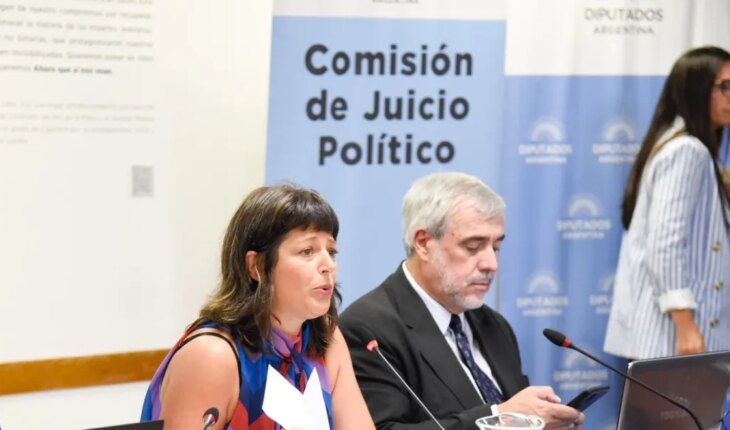This Thursday the Impeachment Commission of the Chamber of Deputies met to review the arguments of the official and opposition deputies, associations of jurists and social rights and lawyers on which the different requests for prosecution of the ministers of the Supreme Court of Justice Horacio Rosatti, Carlos Rosenkrantz, Juan Carlos Maqueda and Ricardo Lorenzetti are based. to those who accuse of poor performance of their duties. The session was the prelude to the key meeting that will take place on Thursday, February 9, to determine if there are arguments to accept the admissibility of the investigation, an instance prior to the opening of the investigation for the production of evidence against the magistrates. The president of the commission, Carolina Gaillard, announced at the end of the meeting that although the accusations are different and not all involve the same members of the highest court, the declaration of admissibility will be made through a single vote by simple majority, which motivated the rejection of the head of the Civic Coalition bloc, Juan Manuel López, who demanded a voting modality that allows to distinguish the different accusations, taking into account that his space intends to vote in favor of the admissibility of the request for impeachment against Ricardo Lorenzetti, but not the rest of the accusations against the court. The list of exhibitors was opened by the deputy of the Civic Coalition, Paula Oliveto, who assured that the request for political trial against Lorenzetti belongs to her bloc and was presented by Elisa Carrio. “At that time we were the government and it was not accompanied by President Mauricio Macri or his Minister of Justice Germán Garavano,” Oliveto said while noting that the request for prosecution “does not respond to any motivation to pressure the Supreme Court nor is it a factor of extortion.” Oliveto pointed against Lorenzetti for lack of “suitability” and “transparency” in the performance of his duties and accused him of being “articulator of a business matrix within the scope of the Judicial Branch.” The deputy of the Civic Coalition listed the 29 facts that are imputed to her and denounced in particular the “discretionary management of millionaire extrabudgetary funds” and the “transfer of structures from the scope of the Council to the scope of the Supreme Court” for the “concentration of power” in Justice. Likewise, he questioned Lorenzetti for “suspicious draws of causes” and irregularities in the processes of computerization of the courts of the Judicial Power.In turn, the deputy of the Frente de Todos Eduardo Valdés, who presented the request for impeachment to the Court that the Executive promoted, argued multiple complaints of the ruling party against the judges for poor performance in the exercise of their functions for the political benefit of the opposition. At first, he mentioned the precautionary measure for co-participation in what they understand from the ruling party as a benefit to the City of Buenos Aires in the conflict of resources, to the detriment of the provinces. “It is a mission and function of Congress,” said the legislator while noting that it is “inadmissible” that the Supreme Court has rejected the request of a group of pro-government governors to appear as “amicus curiae” of the court in this case. In this sense, he focused on the denunciation of the ruling party to the president of the Court, Horacio Rosatti, for “influence peddling for the exclusive benefit of one jurisdiction to the detriment of the rest”, following the scandal over the suspicious chat conversations that came to light between his spokesman, Silvio Robles, and the Minister of Justice and Security of Buenos Aires on leave. Marcelo D’Alessandro.Secondly, Valdés mentioned the complaint of poor performance to the Court for the ruling with which he favored Together for Change in the composition of the Council of the Magistracy. “They want to decide how the political blocs are going to be integrated into the Council of the Magistracy,” he denounced, and pointed out that as a result of this “invasion” of competences Rosatti is accused of the crime of abuse of authority. Along the same lines, the ruling party deputy reviewed the complaint against the Court for “declaring unconstitutional” the law of the Council of the Magistracy “sanctioned 15 years earlier” to “resurrect a law repealed” in 2006 with the sole purpose of placing Rosatti as head of the body in charge of the selection and eventual removal of judges. For this reason, the
Frente de Todos added as grounds for impeachment the complaint to the president of the Court for “violating the Law of Public Ethics” and for “prevarication” for “accommodating the majorities to preside” the Council of the Magistracy.Valdés indicated that the Frente de Todos denounces Rosatti for poor performance for the “Muiña” case, the ruling with which the Court tried to benefit in 2017 with the commutation of the sentence of repressors of the last military dictatorship and that was revoked by the repudiation of society that instantly gathered in a massive mobilization in repudiation of the “2×1 ruling”. The deputy mentioned the complaint of poor performance to the four members of the court for “the inefficient administration of the social work of the Judicial Power of the Nation to the detriment of the affiliates of that social work.” Other speakers who were also arguing were the national deputy of the Frente de Todos of the unionist line María Rosa Martínez, for the Argentine Association of Jurists Claudio Rocca, for the Civil Association for the Enforceability of Social Rights Federico Méndez, and the private complainants Ricardo La Greca, Diego Sánchez, Pablo Llonto and Patricia Isasa.La last private complainant is a former detainee by the military dictatorship who as a teenager, In 1976, she was kidnapped, tortured and raped by Eduardo Ramos, a repressor who in the 90s ended up being employed by Rosatti during his term as mayor of the City of Santa Fe. The woman recounted all the twists and turns she had to go through for the repressor to be convicted, and revealed that Rosatti ignored her when in a meeting in February 1998 she wanted to warn her about the criminal record of her employee. Also present at the commission meeting was the referent of Mothers of Plaza de Mayo Founding Line Nora Cortiñas accompanying the requests for impeachment against the supreme judges.
Impeachment of the Court: The Commission Made Progress in Reviewing the Accusations Against the Court
February 3, 2023 |





